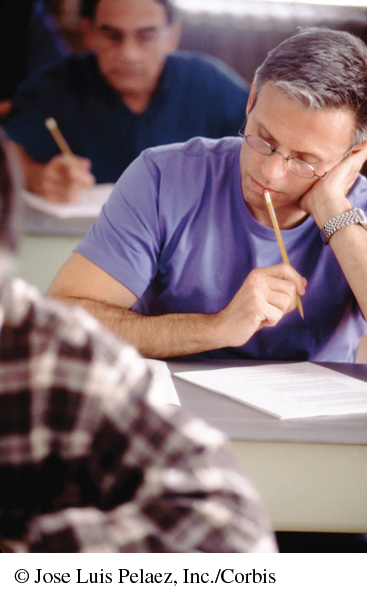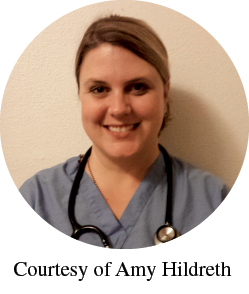Use Test-Taking Skills at Work
If you think that test taking has nothing to do with the work world, think again. The skills needed to excel on tests in college courses are just as valuable in any job or career you pursue. As in college, effective test taking lets you “show what you know” at work.

Answer Questions Confidently
In any job you’ll need to respond to questions from your supervisor and coworkers, and possibly customers and suppliers. Of course, these people won’t ask you multiple-choice, fill-in-the-blank, or true/false questions or demand that you write an essay. But the preparation and thinking skills needed to respond effectively to their questions are the same skills you use to answer questions correctly on college tests.
For example, suppose your boss asks you to evaluate proposals from five marketing agencies that want to handle the advertising campaign for your company’s new product. You’ll need to recall detailed information about the product, evaluate the different options presented by the agencies, and eliminate poor choices (such as agencies that charge high fees). These are the same skills you use to respond to multiple-choice questions on exams.
Or let’s say a patient asks about the side effects of his medication or a coworker wants to know which part to replace to fix a wind turbine’s gearbox. To answer these questions, you “fill in the blank” by providing a precise, accurate response. If you’re in human resources, a coworker might ask you about the health care options in your company’s benefits plan. You’ll need the same critical thinking skills — in this case, comparing and contrasting several options — that you draw on when taking essay tests.
The test-taking abilities you’re developing can help you respond to all types of questions in the workplace — which, in turn, can help you do everything from demonstrating product knowledge, to boosting sales, to building relationships.
Take Exams for Work
Besides helping you answer questions at work, test-taking skills can be useful for taking work-related exams. These skills can help you pass licensure or certification exams required to enter professions ranging from landscaping, paralegal work, and real estate to counseling and graphic design. In some careers, employees also have to take annual performance assessments to show whether they’re functioning at the required level in their job.
In addition, many professions require individuals to earn continuing education credits, which provide evidence of ongoing learning and professional development. Large organizations might also provide educational opportunities such as online tutorials, which often conclude with tests to show what you’ve learned from the training. For example, suppose you’re a new manager, and you take an online course on how to create a budget. After finishing the tutorial, you complete a test that checks your knowledge. The results include feedback on course content you need to review to address any weak areas — information you can use to get the most out of your learning experience.
voices of experience: employee
TAKING TESTS ON THE JOB

| NAME: | Amy Hildreth |
| PROFESSION: | Registered Nurse |
| SCHOOL: | Des Moines Area Community College |
| DEGREE: | Associate Degree in Nursing |
| MAJOR: | Nursing |
“Knowing how to prepare for exams has been critical to my success — both inside and outside of school.”
I went back to school when I was thirty-four to become a registered nurse. In nursing school you’re evaluated on written exams and skills. The written exams may have several correct answers, but you have to learn how to choose the best answer. Also, you need to be able to perform skills/scenarios in front of instructors. It was a tough curriculum — each term our class size got smaller and smaller — but I learned how to prepare for exams so I could make it through.
This regular evaluation of my skills and knowledge continued even after I graduated from the nursing program. After graduation you have to sit for a national licensing exam with the board of nursing in order to demonstrate competency as a registered nurse. To prepare for this exam, I enrolled in a week-long review class and purchased books and CDs with hundreds of practice questions so I could test myself. Those practice questions were a huge help.
After I passed the board of nursing exam, I had more testing to complete. Before I could start my first job as an RN, I had to perform math calculations for drug conversions and IV pumps and take a pretest to assess my basic nursing knowledge. Also, now that I’m an RN, there are continuing education and recertification requirements. We have practice skills and scenarios we have to attend yearly, and there are multiple tests and worksheets to complete for the unit I work in. There are also continuing education requirements to renew my license, and I’m working on becoming certified in my nursing specialty (critical care), which is similar to preparing for my licensure exam. I’ll go to a study course and take practice tests in order to get ready.
Knowing how to prepare for exams has been critical to my success — both inside and outside of school. Figuring out how to prepare for exams in college helped me become an RN, and now these same skills are helping me move forward in my career.
YOUR TURN: Are you interested in pursuing a job that will require you to pass certification or licensure exams? If so, which preparation strategies described by Amy sound most useful to you? If you’ve already passed such exams, what strategies helped you most? If you’ve had difficulty passing these exams, what might you do differently in the future?